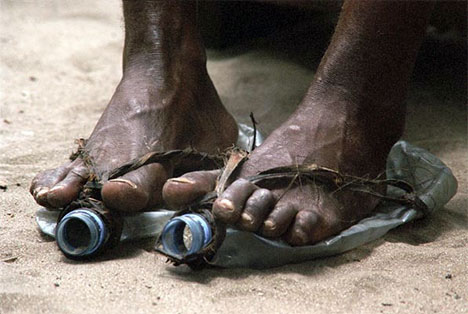
“When you did it to one of the least of these my brothers and sisters, members of my family, you did it to me.” (v. 40).
We all have done it. We have all walked by someone in need and looked the other way. I recall times in my own life when I crossed the street to avoid people looking for a handout. We have all done it. This passage from Matthew 25 makes me uncomfortable is some many ways. I cannot help everyone; we cannot help everyone. But what we can do is remember what Jesus said: “When you do it to the least of these, my family, you did it to me” – not, please notice, just the certifiably hungry and truly deserving. The only criteria he set was “least of these.”
Who are the “least of these?” The weak, the vulnerable, the little ones. What you and I are called to do is not overlook or ignore, but to look into a human face and to see there the face of Jesus Christ, because that is what he said.
Any student of the New Testament knows that the only description of the last judgment is right here in this passage from Matthew’s gospel. In this story, there is nothing about ecclesiastical connections or religious practices. There is nothing about theology, creeds, orthodoxies. The only criterion that mentioned is whether or not we saw Jesus Christ in the face of the needy and whether or not you gave yourself away in love in his name. Let me say that differently. In the end, at the last judgment that we will all face, how we have treated others will be the only criterion used.
Each year I make an appointment with my doctor. I have blood drawn, perhaps an x-ray and an EKG. I meet with the doctor who forces me to get on a scale, pokes and prods, asks questions and in the end announces if I am healthy or not. Usually, except a few things, like the scale, I am pretty healthy. In many ways, the passage from Matthew is a wellness check. The passage is not meant to scare or condemn but only as a wellness check on our spiritual life, just like a wellness check on our bodies, to see where we are and how we might change our habits, so our lives become healthier and more balanced.
These words of Jesus are a call to a radically new social structure based on the God-given dignity and value of every human being, regardless of their gender, race, creed, national origin, socio-economic status, religion, or no religion, etc. The God-given dignity and value of every human being. “What you do for, and to, the least of these, you do to me.”
There are three essential ideas here in this passage.
A statement about God is the first. God is not some remote being on some far off mountain or cloud, God is right here, in the messiness and ambiguity of life. God is here in good times and in bad. In calm weather and the hurricane. God is most present in the ones that are needy. If we want to see that face of God we only have to look into the faces of one of the least of these, the vulnerable, the weak, the children.
The second radical statement is about religion. All throughout history terrible atrocities have been committed, and are still being committed by people shouting about God. Religious officials hide clergy abuse and other abuse and try to explain it away and justify it with references to Mary and Joseph and others in Scripture. Religions deny communion to those with whom they disagree. Religious leaders and others condemn each other, excommunicate each other, invest inordinate amounts of energy and resources fighting one another over who gets in and who is kept out, over whose doctrinal formulas are correct and whose are false most of which Jesus had nothing to say.
The third thing said here is not social, political, economic, or even religious it is personal. God desires not only a world modeled on the values and teachings of Jesus Christ, God wants us – each of us. God is not a social engineer but a God of love who wants to save our souls and redeem us and give us the gift of life – true, deep, authentic human life.
God saves us by touching our hearts with love by gently persuading us to care and see other human beings who need us. God wants to save us from obsessing about ourselves, our own needs, by persuading us to forget about ourselves and worry about others.
Loving those for whom Jesus gave his life, particularly those who are undervalued, is primary expression of our love for God and our experience of God’s love for us. God’s greatest project, the entire reason that Jesus died on the cross, was to teach us the fundamental lesson, the secret, the truth – that to live is to love.
